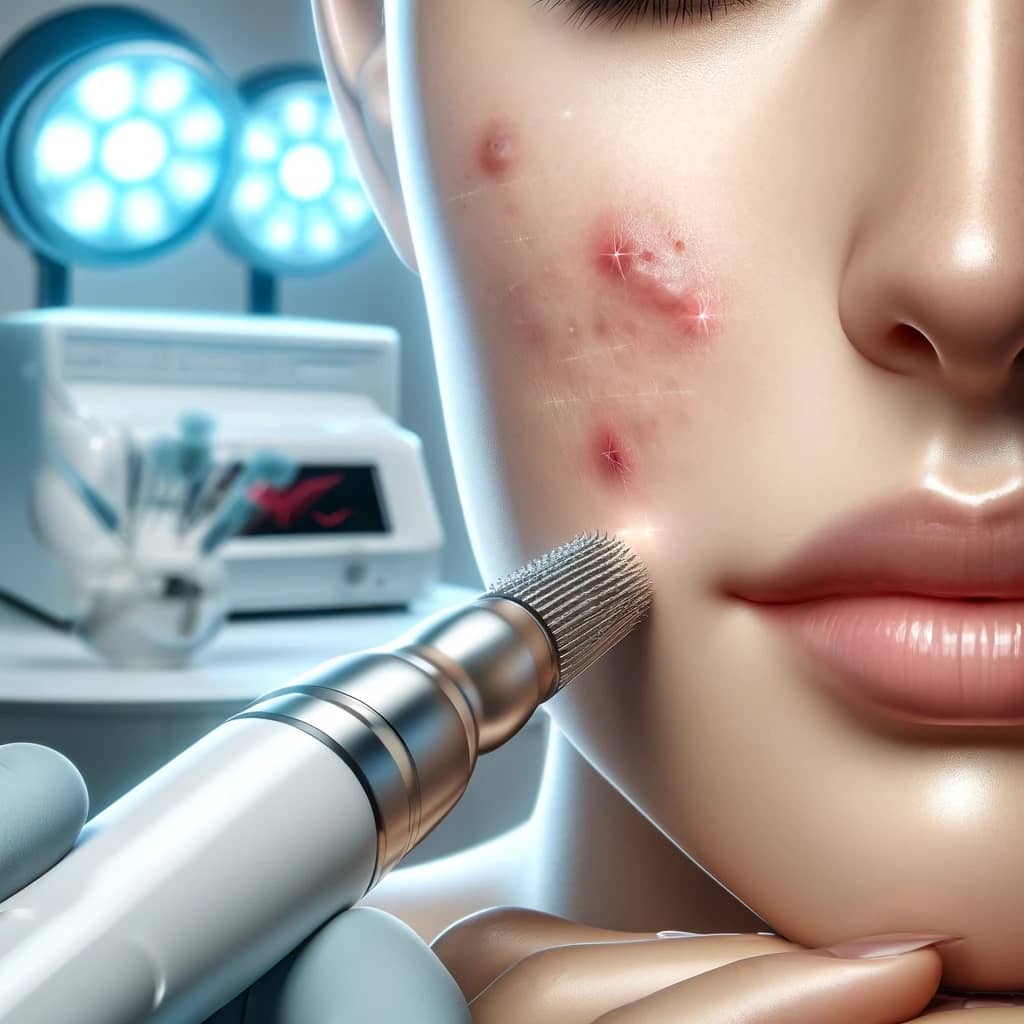Scars from previous breakouts can be a disconcerting and frequent reminder. Whether you’re dealing with deep ice pick scars, rolling scars, or hyperpigmentation, the aftermath of acne can take a toll on your self-confidence. Fortunately, acne scar microneedling has emerged as a highly effective treatment option for diminishing the appearance of scars and revealing smoother, more even-toned skin. In this comprehensive guide, we’ll dive into the science behind microneedling for acne scars, explore its benefits and risks, and help you determine if this innovative treatment is right for you.
What is Microneedling?
Microneedling, also known as collagen induction therapy, is a minimally invasive skin rejuvenation technique that involves using fine needles to create controlled micro-injuries in the skin. These tiny punctures stimulate the body’s natural healing response, triggering the production of collagen and elastin – the building blocks of healthy, youthful-looking skin.
During a microneedling treatment, a trained professional uses a handheld device fitted with sterile, ultra-thin needles to create thousands of microscopic channels in the skin. The depth of the needles can be adjusted based on the individual’s skin concerns and the area being treated. As the needles penetrate the skin, they create a controlled injury that kickstarts the skin’s regenerative processes.
How Does Microneedling Help with Acne Scars?
Acne scars form when the skin’s healing process is disrupted, often due to severe inflammation or picking at active breakouts. This can lead to the overproduction or underproduction of collagen, resulting in textural irregularities and discoloration. Microneedling for acne scars works by harnessing the skin’s innate ability to repair itself, encouraging the remodeling of scar tissue and the formation of new, healthy skin cells.
When the needles create micro-injuries in the skin, the body responds by releasing growth factors and increasing blood flow to the treated area. This influx of nutrients and oxygen supports the production of collagen and elastin, which work to fill in depressed scars, smooth out rough textures, and improve overall skin tone and elasticity.
Additionally, microneedling creates channels that allow topical skincare products, such as serums and growth factors, to penetrate deeper into the skin. This enhanced absorption can further support the healing process and amplify the treatment’s scar-reducing effects.
Benefits of Microneedling for Acne Scars
Microneedling offers a multitude of benefits for those looking to minimize the appearance of acne scars:
- Reduces scar depth: By stimulating collagen production, microneedling helps fill in depressed scars, making them less noticeable and creating a smoother skin surface.
- Improves skin texture: The controlled injury created by the needles breaks up fibrous scar tissue, allowing for the formation of new, healthy skin cells that improve overall skin texture.
- Enhances skin tone: Microneedling can help fade post-inflammatory hyperpigmentation (dark spots) associated with acne scars, resulting in a more even skin tone.
- Boosts product absorption: The micro-channels created during the treatment allow skincare products to penetrate deeper into the skin, enhancing their efficacy and potentially accelerating the scar healing process.
- Minimally invasive: Compared to more aggressive scar treatments like laser resurfacing or dermabrasion, microneedling is a minimally invasive option with less downtime and a lower risk of complications.
- Versatile: Microneedling can be used to treat a variety of acne scar types, including ice pick, boxcar, and rolling scars, as well as address other skin concerns like fine lines, wrinkles, and uneven skin texture.
What to Expect During an Acne Scar Microneedling Treatment
Before undergoing microneedling for acne scars, you’ll consult with a trained skincare professional to discuss your goals, assess your skin, and determine if you’re a good candidate for the treatment. They will also provide pre-treatment instructions, which may include avoiding certain skincare products and medications that can increase sensitivity or interfere with the healing process.
On the day of your treatment, your skin will be thoroughly cleansed, and a topical numbing cream may be applied to minimize discomfort. The microneedling device will then be passed over the treatment area, creating micro-injuries in a controlled, precise manner. The length of the treatment will depend on the size of the area being addressed but typically ranges from 20-60 minutes.
After the procedure, your skin may appear red and feel slightly sensitive, similar to a mild sunburn. Your skincare professional will provide post-treatment instructions, which may include avoiding direct sun exposure, applying a gentle moisturizer, and refraining from using active skincare ingredients for a few days.
Most people require a series of microneedling treatments to achieve optimal results, with sessions typically spaced 4-6 weeks apart. The number of treatments needed will depend on the severity of your acne scars and your individual response to the therapy.
Potential Risks and Side Effects
While microneedling is generally considered safe when performed by a trained professional, there are some potential risks and side effects to be aware of:
- Redness and swelling: It’s normal to experience some redness and swelling after the treatment, which usually subsides within a few days.
- Bruising: In some cases, particularly when treating delicate areas like the under-eyes, bruising may occur but should resolve on its own within a week.
- Infection: Although rare, there is a risk of infection if the treatment is not performed in a sterile environment or if post-treatment instructions are not followed properly.
- Pigmentation changes: In rare instances, microneedling may cause temporary hyperpigmentation (darkening of the skin) or hypopigmentation (lightening of the skin), especially in those with darker skin tones.
To minimize the risk of complications, it’s crucial to choose a reputable, experienced provider and follow all pre- and post-treatment instructions carefully.
Is Microneedling Right for Your Acne Scars?
Microneedling can be an excellent option for those looking to improve the appearance of acne scars, but it may not be suitable for everyone. The best candidates for this treatment are those with mild to moderate scarring, relatively healthy skin, and realistic expectations.
Factors that may make you a less ideal candidate for microneedling include:
- Active acne breakouts
- Skin conditions like rosacea or eczema are common.
- Use of certain medications, like isotretinoin (Accutane)
- Keloid or hypertrophic scarring
- Compromised immune system
If you’re considering microneedling for your acne scars, it’s essential to consult with a qualified skincare professional who can assess your individual needs and determine if this treatment is right for you.
Acne Scar Microneedling Before and After
While individual results may vary, many people experience significant improvements in the appearance of their acne scars after a series of microneedling treatments. These transformations can be seen in countless before and after photos, which showcase the treatment’s ability to diminish scar depth, smooth out texture, and even out skin tone.
It’s important to remember that microneedling is not a quick fix, and results are typically seen gradually over the course of several treatments. However, with patience and commitment, this innovative therapy can help you achieve the clearer, smoother skin you deserve.
Acne scar microneedling is a safe, effective, and minimally invasive treatment option for those looking to diminish the appearance of scars and reveal healthier, more even-toned skin. By harnessing the skin’s natural healing processes, this innovative therapy can help fill in depressed scars, smooth out texture, and boost overall skin quality.
If you’re struggling with the aftermath of acne and are seeking a solution for your scars, microneedling may be the answer you’ve been looking for. Consult with a trusted skincare professional to learn more about this transformative treatment and discover how it can help you achieve your skin goals.



